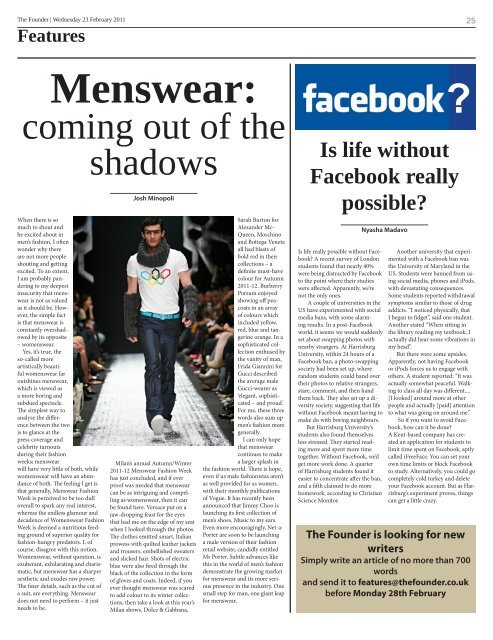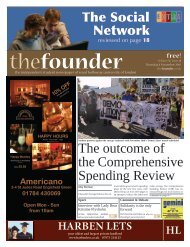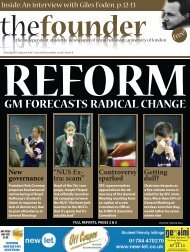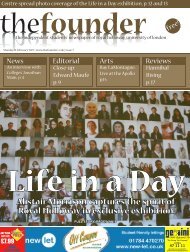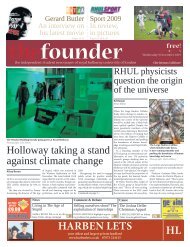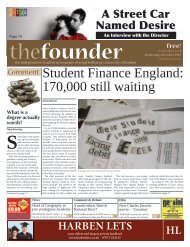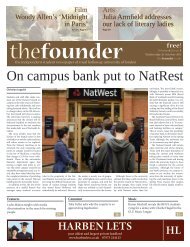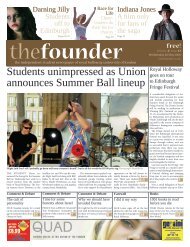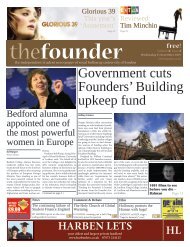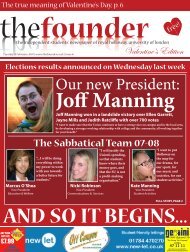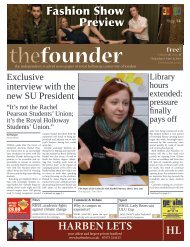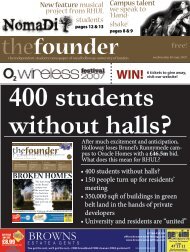Create successful ePaper yourself
Turn your PDF publications into a flip-book with our unique Google optimized e-Paper software.
<strong>The</strong> <strong>Founder</strong> | Wednesday 23 February 2011<br />
Features<br />
25<br />
<strong>Menswear</strong>:<br />
coming out of the<br />
shadows<br />
When there is so<br />
much to shout and<br />
be excited about in<br />
men’s fashion, I often<br />
wonder why there<br />
are not more people<br />
shouting and getting<br />
excited. To an extent,<br />
I am probably pandering<br />
to my deepest<br />
insecurity that menswear<br />
is not as valued<br />
as it should be. However,<br />
the simple fact<br />
is that menswear is<br />
constantly overshadowed<br />
by its opposite<br />
– womenswear.<br />
Yes, it’s true, the<br />
so-called more<br />
artistically beautiful<br />
womenswear far<br />
outshines menswear,<br />
which is viewed as<br />
a more boring and<br />
subdued spectacle.<br />
<strong>The</strong> simplest way to<br />
analyse the difference<br />
between the two<br />
is to glance at the<br />
press coverage and<br />
celebrity turnouts<br />
during their fashion<br />
weeks; menswear<br />
will have very little of both, while<br />
womenswear will have an abundance<br />
of both. <strong>The</strong> feeling I get is<br />
that generally, <strong>Menswear</strong> Fashion<br />
Week is perceived to be too dull<br />
overall to spark any real interest,<br />
whereas the endless glamour and<br />
decadence of Womenswear Fashion<br />
Week is deemed a nutritious feeding<br />
ground of superior quality for<br />
fashion-hungry predators. I, of<br />
course, disagree with this notion.<br />
Womenswear, without question, is<br />
exuberant, exhilarating and charismatic,<br />
but menswear has a sharper<br />
aesthetic and exudes raw power.<br />
<strong>The</strong> finer details, such as the cut of<br />
a suit, are everything. <strong>Menswear</strong><br />
does not need to perform – it just<br />
needs to be.<br />
Josh Minopoli<br />
Milan’s annual Autumn/Winter<br />
2011-12 <strong>Menswear</strong> Fashion Week<br />
has just concluded, and if ever<br />
proof was needed that menswear<br />
can be as intriguing and compelling<br />
as womenswear, then it can<br />
be found here. Versace put on a<br />
jaw-dropping feast for the eyes<br />
that had me on the edge of my seat<br />
when I looked through the photos.<br />
<strong>The</strong> clothes emitted smart, Italian<br />
prowess with quilted leather jackets<br />
and trousers, embellished sweaters<br />
and slicked hair. Shots of electric<br />
blue were also fired through the<br />
black of the collection in the form<br />
of gloves and coats. Indeed, if you<br />
ever thought menswear was scared<br />
to add colour to its winter collections,<br />
then take a look at this year’s<br />
Milan shows. Dolce & Gabbana,<br />
Sarah Burton for<br />
Alexander Mc-<br />
Queen, Moschino<br />
and Bottega Veneta<br />
all had blasts of<br />
bold red in their<br />
collections – a<br />
definite must-have<br />
colour for Autumn<br />
2011-12. Burberry<br />
Porsum enjoyed<br />
showing off peacoats<br />
in an array<br />
of colours which<br />
included yellow,<br />
red, blue and tangerine<br />
orange. In a<br />
sophisticated collection<br />
enthused by<br />
the vanity of man,<br />
Frida Giannini for<br />
Gucci described<br />
the average male<br />
Gucci-wearer as<br />
‘elegant, sophisticated<br />
– and proud.’<br />
For me, these three<br />
words also sum up<br />
men’s fashion more<br />
generally.<br />
I can only hope<br />
that menswear<br />
continues to make<br />
a larger splash in<br />
the fashion world. <strong>The</strong>re is hope,<br />
even if us male fashionistas aren’t<br />
as well provided for as women,<br />
with their monthly publications<br />
of Vogue. It has recently been<br />
announced that Jimmy Choo is<br />
launching its first collection of<br />
men’s shoes. Music to my ears.<br />
Even more encouragingly, Net-a-<br />
Porter are soon to be launching<br />
a male version of their fashion<br />
retail website, candidly entitled<br />
Mr Porter. Subtle advances like<br />
this in the world of men’s fashion<br />
demonstrate the growing market<br />
for menswear and its more serious<br />
presence in the industry. One<br />
small step for man, one giant leap<br />
for menswear.<br />
Is life without<br />
Is life really possible without Facebook?<br />
A recent survey of London<br />
students found that nearly 40%<br />
were being distracted by Facebook<br />
to the point where their studies<br />
were affected. Apparently, we’re<br />
not the only ones.<br />
A couple of universities in the<br />
US have experimented with social<br />
media bans, with some alarming<br />
results. In a post-Facebook<br />
world, it seems we would suddenly<br />
set about swapping photos with<br />
nearby strangers. At Harrisburg<br />
University, within 24 hours of a<br />
Facebook ban, a photo-swapping<br />
society had been set up, where<br />
random students could hand over<br />
their photos to relative strangers,<br />
stare, comment, and then hand<br />
them back. <strong>The</strong>y also set up a diversity<br />
society, suggesting that life<br />
without Facebook meant having to<br />
make do with boring neighbours.<br />
But Harrisburg University’s<br />
students also found themselves<br />
less stressed. <strong>The</strong>y started reading<br />
more and spent more time<br />
together. Without Facebook, we’d<br />
get more work done. A quarter<br />
of Harrisburg students found it<br />
easier to concentrate after the ban,<br />
and a fifth claimed to do more<br />
homework, according to Christian<br />
Science Monitor.<br />
?<br />
Facebook really<br />
possible?<br />
Nyasha Madavo<br />
Another university that experimented<br />
with a Facebook ban was<br />
the University of Maryland in the<br />
US. Students were banned from using<br />
social media, phones and iPods,<br />
with devastating consequences.<br />
Some students reported withdrawal<br />
symptoms similar to those of drug<br />
addicts. “I noticed physically, that<br />
I began to fidget”, said one student.<br />
Another stated “When sitting in<br />
the library reading my textbook, I<br />
actually did hear some vibrations in<br />
my head”.<br />
But there were some upsides.<br />
Apparently, not having Facebook<br />
or iPods forces us to engage with<br />
others. A student reported: “It was<br />
actually somewhat peaceful. Walking<br />
to class all day was different....<br />
[I looked] around more at other<br />
people and actually [paid] attention<br />
to what was going on around me.”<br />
So if you want to avoid Facebook,<br />
how can it be done?<br />
A Kent-based company has created<br />
an application for students to<br />
limit time spent on Facebook, aptly<br />
called iFreeFace. You can set your<br />
own time limits or block Facebook<br />
to study. Alternatively, you could go<br />
completely cold turkey and delete<br />
your Facebook account. But as Harrisburg’s<br />
experiment proves, things<br />
can get a little crazy.<br />
<strong>The</strong> <strong>Founder</strong> is looking for new<br />
writers<br />
Simply write an article of no more than 700<br />
words<br />
and send it to features@thefounder.co.uk<br />
before Monday 28th February


